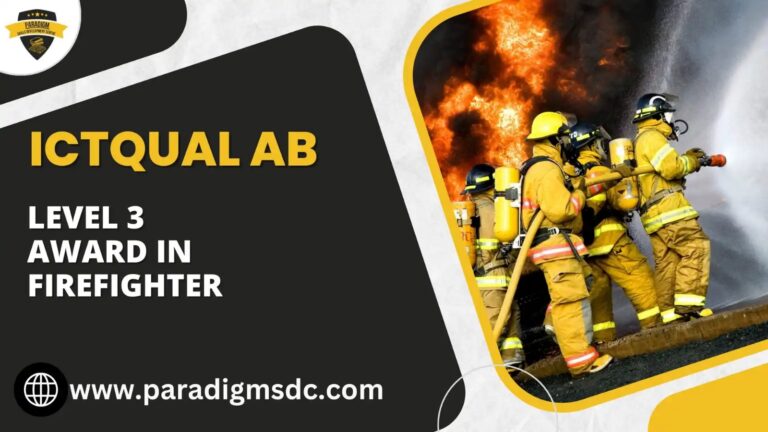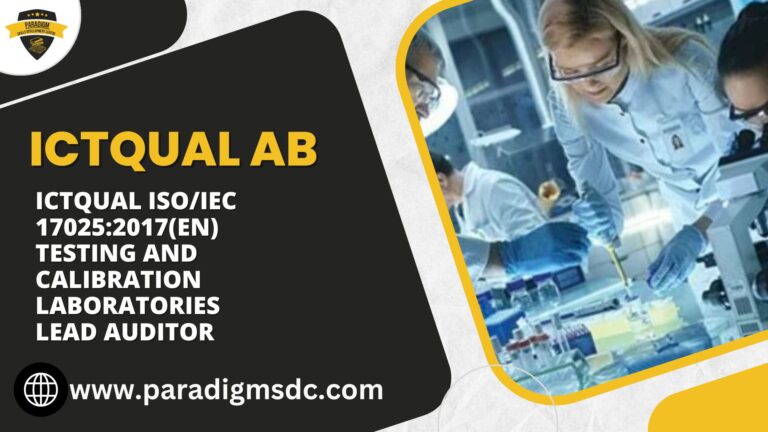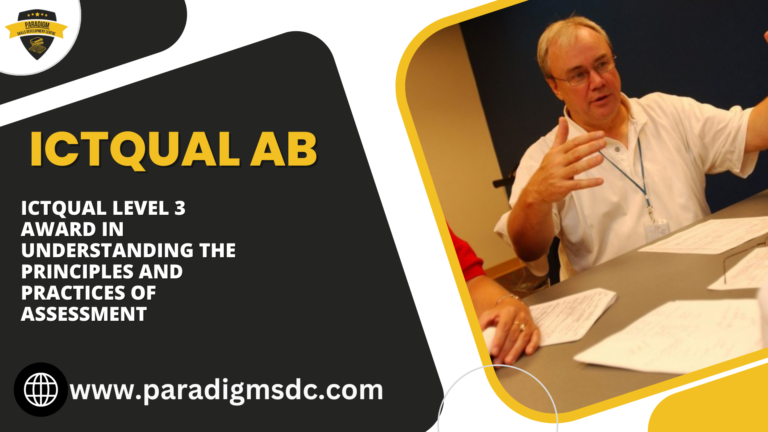Course Introduction
The ICTQual Level 2 Award in Citizen AID aims to empower individuals with the ability to respond to emergencies confidently and competently. This course provides a comprehensive understanding of emergency response protocols, ensuring that participants are well-prepared to handle unforeseen circumstances. Whether you are a concerned citizen, a community leader, or someone looking to enhance their emergency preparedness skills, this course offers valuable insights and practical knowledge.
Course Overview
The ICTQual Level 2 Award in Citizen AID covers a wide range of topics related to emergency response and preparedness. Participants will gain an in-depth understanding of the principles of first aid, emergency planning, and effective communication during crises. The course is structured to provide both theoretical knowledge and hands-on practical experience, ensuring that learners can apply their skills in real-life situations.
Course Study Units
- Introduction to Citizen AID
- Threat Awareness and Personal Safety
- Medical Emergencies
- Trauma Management
- Communication and Coordination
- Psychological First Aid
Learning Outcomes
By the end of the course, participants will be able to:
Introduction to Citizen AID
- Understanding of Citizen AID Principles: Gain a comprehensive understanding of the principles and objectives of Citizen AID, including the REACT acronym and the role of bystander intervention in emergency response.
- Awareness of Community Empowerment: Recognize the importance of empowering communities to respond effectively to emergencies and the role that individuals can play in supporting each other during critical incidents.
- Historical Context: Explore the history and development of Citizen AID as a proactive approach to enhancing public safety and resilience in the face of evolving threats.
- Ethical Considerations: Consider the ethical implications of bystander intervention and the importance of acting responsibly and ethically when providing assistance to those in need during emergencies.
Threat Awareness and Personal Safety
- Recognition of Potential Threats: Develop the ability to recognize potential threats and hazards in various environments, including public spaces, workplaces, and educational institutions.
- Risk Assessment Skills: Acquire skills in conducting risk assessments and evaluating the level of danger posed by different situations, including assessing the presence of weapons or suspicious behavior.
- Personal Safety Strategies: Learn strategies and techniques for prioritizing personal safety while responding to emergencies, including situational awareness, evasion tactics, and the importance of seeking cover or shelter.
- Understanding of Response Protocols: Understand the importance of following established response protocols and guidelines for personal safety, including procedures for evacuating or sheltering in place during emergencies.
Medical Emergencies
- Recognition of Medical Emergencies: Develop the ability to recognize signs and symptoms of common medical emergencies, including cardiac arrest, choking, severe bleeding, and allergic reactions.
- Basic Life Support Skills: Acquire practical skills in performing basic life support interventions, including cardiopulmonary resuscitation (CPR), the use of automated external defibrillators (AEDs), and techniques for opening and maintaining airways.
- First Aid Techniques: Learn first aid techniques for treating minor injuries, administering medications (e.g., epinephrine auto-injectors for anaphylaxis), and providing initial care for individuals with medical conditions such as diabetes or seizures.
- Understanding of Emergency Medical Services: Understand the role and responsibilities of emergency medical services (EMS) providers and the importance of activating EMS assistance promptly when needed.
Trauma Management
- Assessment of Traumatic Injuries: Develop the ability to assess and prioritize traumatic injuries based on severity and potential for life-threatening complications.
- Hemorrhage Control Techniques: Acquire practical skills in controlling external bleeding, including the application of direct pressure, wound packing, and the use of tourniquets or hemostatic agents.
- Airway Management: Learn techniques for managing airway obstruction and ensuring adequate ventilation in individuals with traumatic injuries or compromised airways.
- Stabilization and Transportation: Understand the principles of trauma stabilization and the importance of rapid and safe transportation of injured individuals to definitive care facilities for further treatment.
Communication and Coordination
- Effective Communication Skills: Develop effective communication skills for relaying accurate information to emergency services, coordinating with other responders or bystanders, and providing reassurance to individuals affected by emergencies.
- Use of Communication Devices: Learn how to use communication devices effectively, including mobile phones, two-way radios, and public address systems, to facilitate communication and coordination during emergencies.
- Collaborative Decision-Making: Understand the importance of collaborative decision-making and teamwork in emergency response situations, including the delegation of tasks and the establishment of clear roles and responsibilities.
- Crisis Communication Strategies: Acquire skills in crisis communication, including techniques for managing information flow, addressing misinformation or rumors, and providing updates to stakeholders and the public.
Psychological First Aid
- Recognition of Psychological Distress: Develop the ability to recognize signs of psychological distress in individuals affected by traumatic events, including symptoms of anxiety, fear, grief, and post-traumatic stress.
- Empathic Listening Skills: Acquire skills in empathic listening and providing emotional support to individuals in crisis, including active listening techniques, validation of emotions, and nonjudgmental communication.
- Crisis Intervention Strategies: Learn crisis intervention strategies for assisting individuals in managing acute stress reactions, promoting coping mechanisms, and connecting them with appropriate support services.
- Self-Care Practices: Understand the importance of self-care for responders and volunteers involved in emergency response activities, including strategies for managing stress, maintaining resilience, and seeking support when needed.
Course Benefits
- Enhanced Preparedness: Gain the skills and confidence to respond effectively in emergencies.
- Practical Knowledge: Hands-on training ensures that learners can apply what they have learned in real-world situations.
- Community Impact: Equip yourself to make a positive difference in your community during emergencies.
- Certification: Receive a recognized qualification that validates your emergency preparedness skills.
Who is This Course For?
The ICTQual Level 2 Award in Citizen AID is ideal for:
- Community members who want to be prepared for emergencies.
- Individuals involved in community leadership roles.
- Volunteers and staff of non-profit organizations.
- Parents, teachers, and caregivers.
- Anyone interested in enhancing their emergency response skills.
Future Progression
Upon completing the ICTQual Level 2 Award in Citizen AID, participants can further their knowledge and skills by pursuing advanced courses in emergency response and first aid. Possible progression routes include:
- ICTQual Level 3 Award in Emergency Response
- ICTQual Level 3 Diploma in Health, Safety, and Environment
- Specialized first aid courses, such as Pediatric First Aid or Wilderness First Aid
Investing in the ICTQual Level 2 Award in Citizen AID is a proactive step towards becoming a valuable asset to your community and ensuring you are prepared for any emergency situation. Empower yourself with the knowledge and skills needed to make a real difference when it matters most.







